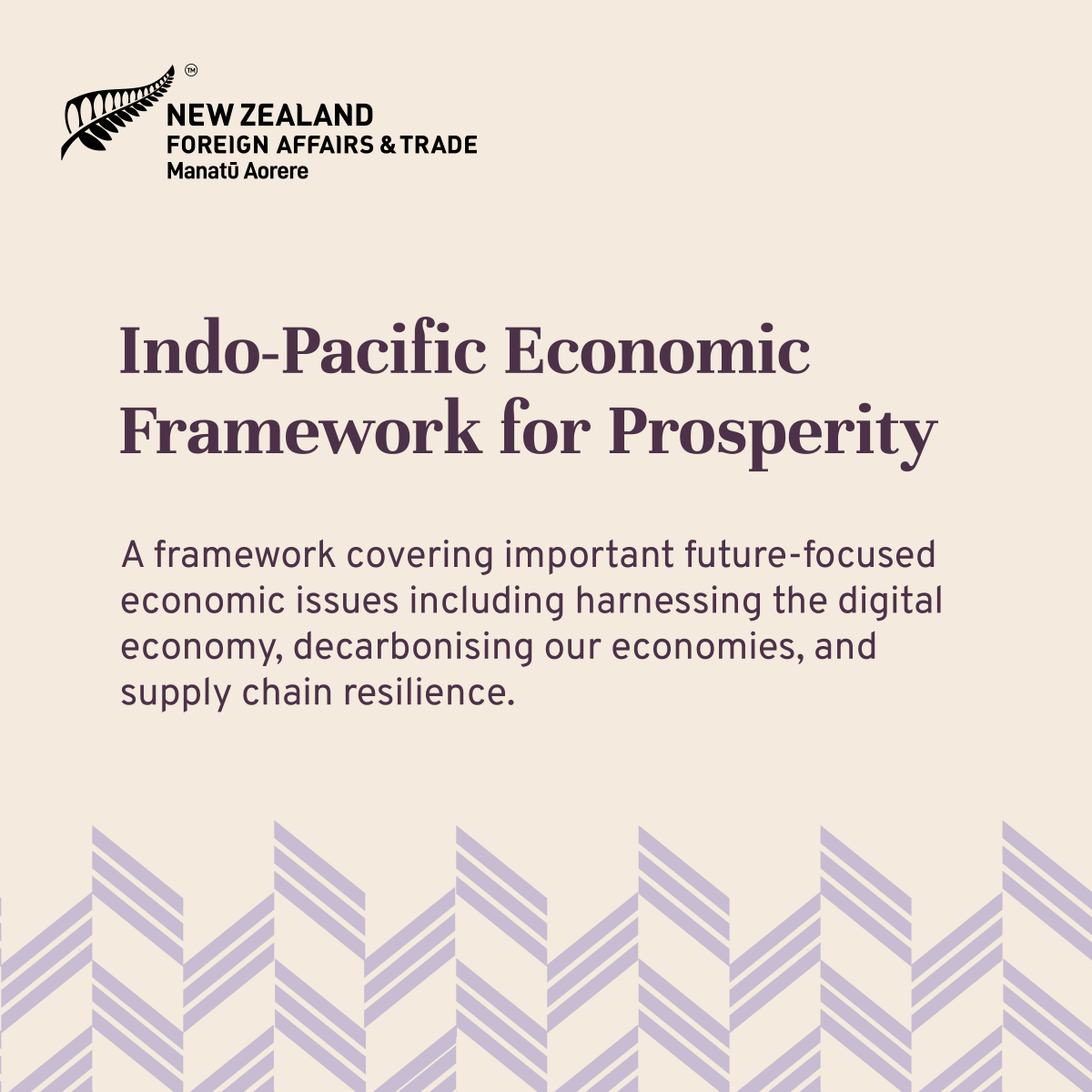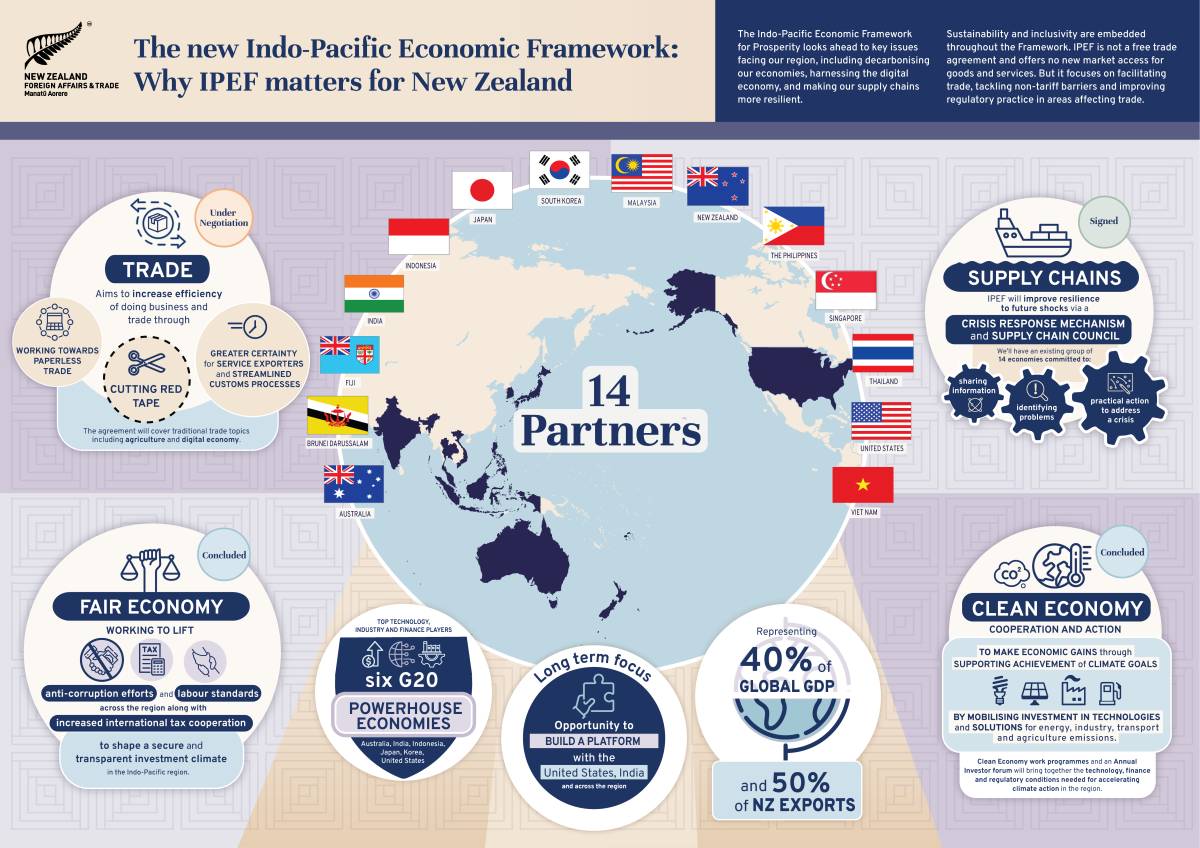
Indo-Pacific Economic Framework for Prosperity (IPEF) overview
The Indo-Pacific Economic Framework for Prosperity (IPEF) is an economic agreement covering three pillars (a separate trade pillar is still under negotiation):
- supply chains;
- clean economy; and
- fair economy.

On 23 May 2022, Leaders from 14 Indo-Pacific countries, including New Zealand, announced the start of talks toward launching negotiations on the Indo-Pacific Economic Framework for Prosperity. The Joint Leaders statement on the proposed initiative can be read here: Statement on Indo-Pacific Economic Framework for Prosperity | The White House(external link).
On 16 November 2023, IPEF partners met in San Francisco to announce the substantial conclusion of negotiations of the Clean Economy Agreement, the Fair Economy Agreement, and an overarching Agreement on the Indo-Pacific Economic Framework for Prosperity, which establishes a ministerial-level council and commission to allow ongoing high level engagement on progress, future direction and membership of IPEF.
In addition, IPEF partners took stock of the significant progress made on negotiations on Trade.
Following the substantial conclusion of the negotiations on the Supply Chain Agreement in May 2023, Ministers signed the Supply Chain Agreement on 14 November 2023.
Ministers met virtually on 14 March 2024 to mark progress under the IPEF framework and to release the texts of the Clean Economy Agreement, the Fair Economy Agreement and the Agreement on IPEF. These texts can be read on the IPEF statements and resources page.
The various statements can be read here:
- US Department of Commerce Press Release marking the March Virtual Ministerial Meeting(external link) – 14 March 2024.
Background
Countries that have committed to the IPEF span our wider home region in the Indo-Pacific and include both ASEAN partners and most of the region’s major economies. Along with New Zealand, Australia, Brunei, Fiji, India, Indonesia, Japan, Korea, Malaysia, the Philippines, Singapore, Thailand, the US and Viet Nam have all pledged to collaborate on closer economic integration in new and novel ways, not limited to trade. Together the 14 economies represented 40% of global GDP in 2021.
The Indo-Pacific region is vital for the prosperity and security of New Zealand. It is home to over half of the world’s population. Strategically it is important for New Zealand to be an active partner in helping shape an Indo-Pacific order that delivers regional stability and economic integration in a sustainable and inclusive way.
The Indo-Pacific Economic Framework for Prosperity strengthens economic cooperation with the United States and other economies across our wider home region.
A fully realised IPEF that includes New Zealand perspectives and ideas will provide an open and inclusive platform for the US to engage more deeply in the economic architecture of the Indo-Pacific, which is valuable for both New Zealand and our region.
The Framework covers some of the most important future-focused economic issues facing our region and the world, including harnessing the digital economy, decarbonising our economies, and making our supply chains more resilient.
The principles of sustainability and inclusivity are embedded throughout the Framework. There are strong linkages between the Framework and the principles that underpin New Zealand’s inclusive trade; principles we are bringing to the table in discussions to ensure the benefits of this Framework are broadly shared by our peoples.
The Indo-Pacific Economic Framework, including the ongoing negotiations under the trade pillar, is not a free trade agreement and does not include market access for goods or services through traditional schedules, though there is commercial opportunity for New Zealand in the Trade pillar through the negotiation of rules on Trade Facilitation, Digital Trade, and Regulatory Cooperation among other things.
In September 2022, the scoping phase of the Framework concluded, and New Zealand joined the launch of negotiations on the four pillars of IPEF negotiations (trade; supply chains; clean economy; and fair economy). Negotiation rounds have taken place in December of 2022, and February, March, May, July, October and November of 2023.

